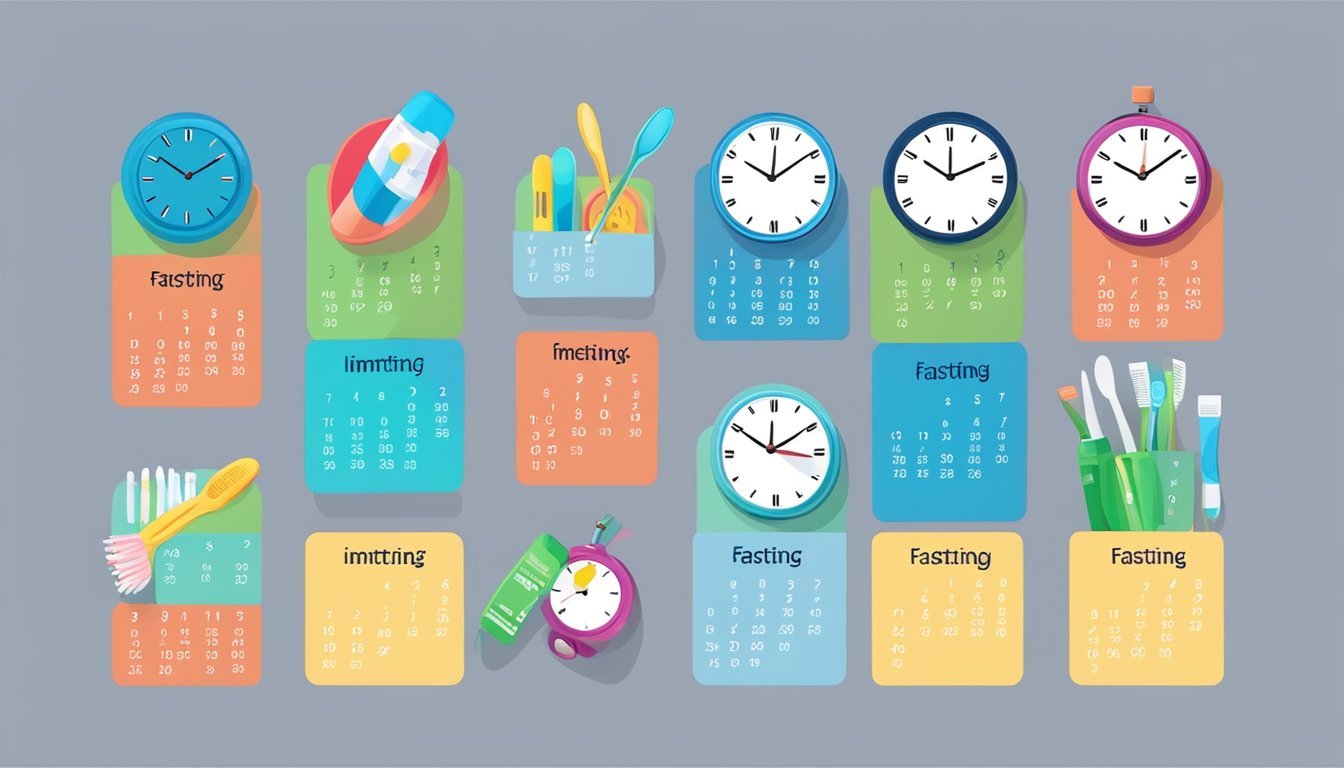Intermittent Fasting and Dental Health
Exploring the Connections
Intermittent fasting, a dietary regimen that alternates between periods of eating and fasting, has gained popularity for its potential health benefits. While much of the focus has been on weight loss and metabolic health, emerging discussions are considering the implications of such eating patterns on oral health. Oral health is integral to overall well-being, with diet playing a crucial role in maintaining healthy teeth and gums.
From a dental perspective, the reduction in meal frequency inherent in intermittent fasting may confer benefits such as decreased risk of tooth decay and gum disease. This is because fewer eating occasions mean less exposure of the teeth to food substances that can lead to plaque buildup and tooth enamel erosion. Additionally, changes in salivary biochemistry during fasting periods might lower glucose levels in the mouth, further reducing the risk of dental caries.
However, intermittent fasting also introduces challenges for oral health, such as the potential for increased acidity in the mouth during fasting, which can weaken tooth enamel. Moreover, individuals may experience symptoms like dry mouth or bad breath during fasting periods, which could have implications for oral hygiene and comfort. It’s essential that individuals practicing intermittent fasting remain aware of these potential oral health impacts and manage them appropriately through consistent dental care and hydration.
Fundamentals of Intermittent Fasting
Intermittent fasting encompasses various eating patterns that cycle between periods of fasting and eating. It's crucial to understand its definition, the common types practiced, and the eating windows associated with these patterns.
Defining Intermittent Fasting
Intermittent fasting (IF) is a dietary approach where individuals alternate between periods of eating and fasting. It's not about what foods to eat, but rather when to eat them. This pattern can lead to various health benefits and is distinct from continuous calorie restriction.
Common Types of Intermittent Fasting
There are several established methods of intermittent fasting, each with its own set of guidelines:
Alternate-Day Fasting (ADF): This involves alternating days of regular eating with days where one either completely fasts or consumes a minimal amount of calories, typically less than 500.
5:2 Diet: Followers eat normally for five days of the week and then choose two non-consecutive days to either fast or eat a significantly reduced calorie intake.
Entities like Ramadan involve a form of intermittent fasting, where the eating pattern aligns with spiritual practices, such as fasting from dawn (suhoor) until sunset.
Understanding the Eating Window
The eating window refers to the timeframe in which food can be consumed during intermittent fasting. This period varies depending on the fasting method:
16/8 Method: Fast for 16 hours each day and consume all calories during the remaining 8-hour window.
18/6 Method: This is a shorter eating window where one fasts for 18 hours and eats during a 6-hour window.
20/4 Method: Known as the Warrior Diet, it involves 20 hours of fasting followed by a 4-hour eating window.
The flexibility of intermittent fasting allows individuals to select a fasting method that best fits their lifestyle, health goals, and dietary preferences.
Impact on Oral Health
Intermittent fasting can lead to changes in the oral environment that potentially affect dental health. This section explores specific aspects of these changes and their implications.
Changes in Oral pH Levels
Intermittent fasting can alter oral pH levels, the measure of how acidic or alkaline the mouth is. The absence of food intake during fasting periods means less opportunity for the production of acid by oral bacteria, which typically occurs when sugars and starches from food are broken down. This may result in a more neutral oral pH, potentially reducing the risk of tooth enamel erosion and dental caries.
Effects on Saliva Production
Intermittent fasting influences saliva production. Saliva is vital for oral health because it helps neutralize acids, wash away food particles, and provides disease-fighting substances throughout the mouth. During fasting, the flow rate and composition of saliva can change, and as a result, the protective function of saliva might be enhanced due to increased concentration of certain protective proteins and minerals.
Influence on Oral Bacteria
The composition of oral bacteria is affected by intermittent fasting. When there is a reduction in snacking and sugar intake, as is common during fasting, there is less substrate available for bacteria that thrive on sugar, namely the cariogenic bacteria. These changes in the microbial composition can be beneficial for oral health by reducing the incidence of tooth decay and improving gum health.
Integrating Diet and Nutrition
In the context of intermittent fasting and dental health, it’s imperative to focus on a balanced inclusion of key nutritional elements during eating periods to maintain oral health and overall well-being.
Choosing Nutrient-Dense Foods
Nutrient-dense foods play a critical role in supporting dental health during intermittent fasting. They provide essential vitamins and minerals that can help in protecting enamel and prevent dental caries. A person’s diet should concentrate on incorporating foods rich in calcium, phosphorus, and vitamins A, C, and D.
Role of Whole Grains, Fruits, and Veggies
A diet rich in whole grains, fruits, and vegetables is vital for maintaining good oral health. Whole grains can reduce the risk of gum disease due to their high fiber content, which also aids in digestion during the eating window. Fruits and veggies, on the other hand, are high in water and fiber content, which helps to keep the mouth clean by washing away food particles and buffering acid production. These foods are foundational to both the Mediterranean and plant-based diets, which emphasize plant foods and whole grains and have been associated with numerous health benefits.
Importance of Lean Proteins and Healthy Fats
Lean proteins and healthy fats are essential for oral health. Proteins provide the building blocks for tissue repair, including the gums and oral mucosa. Foods such as chicken, fish, and legumes, common in a Mediterranean diet, offer lean protein options. Healthy fats, found in fish, nuts, and seeds, provide anti-inflammatory benefits, crucial for preventing conditions such as periodontitis. These nutrients should be included in a balanced diet to support overall health, particularly when following intermittent fasting protocols.
Physiological Benefits of Intermittent Fasting
Intermittent fasting offers various health benefits that are physiologically significant, especially related to metabolic health and disease prevention. Here are some specific improvements observed through intermittent fasting:
Weight Management And Fat Loss
Intermittent fasting can lead to weight loss and reduction in belly fat by creating a calorie deficit and enhancing hormonal function to aid fat loss. Studies have indicated that alternate-day fasting and time-restricted feeding patterns effectively reduce body weight.
Improvements in Blood Sugar Control
Introducing periodic fasting has been shown to stabilize blood sugar levels. Fasting periods can lead to a decrease in fasting glucose, which suggests improved blood sugar control, particularly among adults with obesity.
Enhanced Insulin Sensitivity
Fasting has metabolic benefits that include boosted insulin sensitivity. This improvement helps cells to better respond to insulin, leading to a more efficient glucose uptake from the bloodstream, which can be protective against type 2 diabetes.
Cardiovascular Health Advantages
One demonstrates that intermittent fasting can improve cardiovascular health. Reports have noted a reduction in risk factors such as high cholesterol levels and blood pressure, which are important for maintaining heart health and reducing the risk of heart disease.
Potential Risks and Side Effects
Intermittent fasting can lead to a range of physical challenges, from hunger-related issues to discomforts such as headaches. Understanding these side effects can help individuals make informed decisions about their dental health during fasting periods.
Managing Hunger and Cravings
During intermittent fasting, individuals may experience intense hunger and cravings, which can become disruptive. These sensations are often most prominent in the initial stages of adopting the fasting routine as the body adjusts to the new eating patterns. It's essential for one to consume nutrient-dense foods during the eating window to mitigate hunger pangs, which in turn may prevent the temptation to indulge in sugary snacks that could harm dental health.
Dealing with Headaches and Nausea
Headaches are a common issue in the early days of intermittent fasting, potentially due to hypoglycemia or dehydration. They can be accompanied by feelings of nausea. To combat this, individuals are advised to stay well-hydrated with water and calorie-free beverages. Balancing electrolyte intake can also help alleviate these symptoms. Those who encounter persistent headaches should consult with healthcare providers as it may affect overall well-being, including oral health.
Avoiding Late-Night Snacking
Intermittent fasting often restricts food intake to certain hours, which can help curb late-night snacking—a habit linked to weight gain and increased risk of obesity. Late-night snacking can also increase the risk of dental issues, as it leads to prolonged exposure to sugars and acids that can erode enamel. Individuals practicing fasting should endeavor to plan their meals to prevent hunger at night and protect their oral health.
Intermittent Fasting and Chronic Disease
Intermittent fasting (IF) is increasingly being studied for its effects on various chronic diseases, with research suggesting potential benefits in managing diabetes, insulin resistance, certain cancers, and inflammatory and autoimmune conditions.
Effects on Diabetes and Insulin Resistance
Research indicates that intermittent fasting can improve insulin sensitivity and aid in the management of type 2 diabetes. By alternating periods of fasting with periods of eating, the body may enhance its ability to regulate blood glucose levels. Some studies have shown a reduction in fasting insulin levels, suggesting that IF could be an effective strategy for those at risk of developing diabetes.
Potential Role in Cancer Prevention
Autophagy, a process triggered by intermittent fasting, allows cells to remove damaged components. This may reduce the likelihood of malignant cell transformation — a key factor in cancer development. Additionally, fasting regimes have been associated with a decreased risk of certain types of cancers, although more research is needed to establish IF as a preventive measure.
Impact on Inflammation and Autoimmune Diseases
Intermittent fasting can influence inflammation levels in the body, which are integral to chronic diseases such as arthritis and asthma. Fasting periods promote anti-inflammatory responses that may help mitigate symptoms of autoimmune diseases. The reduction of pro-inflammatory cytokines during IF could potentially lead to improvements in inflammatory conditions.
Psychological and Cognitive Effects
Intermittent fasting has been associated with various psychological and cognitive effects which may influence dental health indirectly through alterations in brain function and mood.
Influence on Brain Function and Memory
Intermittent fasting can lead to the promotion of new nerve cells and may aid in enhancing brain function and memory. Research indicates that such fasting approaches can stimulate neuroprotective responses and possibly improve cognitive function. Brain health is critical, as it ties closely with memory and cognitive abilities. Intermittent fasting is associated with various neurological benefits that include:
Neurogenesis: The formation of new nerve cells is essential for maintaining brain plasticity and memory function.
Neuroprotection: Fasting has been linked with increased production of brain-derived neurotrophic factor (BDNF), which supports the survival of existing neurons and encourages new growth.
These benefits suggest that intermittent fasting might be a valuable lifestyle intervention to sustain and enhance cognitive abilities.
Mood Fluctuations and Energy Levels
Intermittent fasting can also have an impact on an individual's mood and energy levels. Mood fluctuations may occur as the body adjusts to new eating patterns. Initially, individuals may experience:
Fatigue: A common temporary side effect that usually improves as the body adapts.
Mood changes: Some individuals report feeling irritable or experiencing mood swings during fasting periods.
However, over time, regular fasting may lead to stabilized energy levels throughout the day, which could positively affect an individual's mood and overall emotional well-being. It is important to note that reactions to fasting are highly individual, and these experiences can vary widely.
Lifestyle Considerations
Intermittent fasting encompasses various approaches and can be integrated into diverse lifestyles. The impact on dental health during fasting periods is influenced by individual habits, exercise routines, and cultural practices.
Exercise and Activity During Fasting
When individuals engage in intermittent fasting, they often maintain or initiate exercise routines. Exercise during fasting can still be effective, but it's important to listen to one's body and avoid high-intensity workouts that may lead to dehydration. Dehydration during fasting can increase the risk of dry mouth, which in turn elevates the risk of dental caries and other oral health issues. For optimal overall health, one should balance low to moderate-intensity activities with adequate hydration during non-fasting periods.
Adapting Fasting for Different Lifestyles
Intermittent fasting should be tailored to fit different lifestyles. For those with active lifestyles, paying attention to hydration and nutrient intake during eating windows is vital for maintaining oral and overall health. Sedentary individuals may need to adjust their calorie intake on non-fasting days to prevent potential oral health issues associated with overconsumption of sugary or acidic foods that can harm enamel.
Fasting During Ramadan for Muslim Communities
For Muslim communities, fasting during Ramadan involves abstaining from food and drink from dawn until sunset. This can result in extended periods without saliva production due to a lack of fluid intake, increasing the risk of dental problems. It is advisable to focus on hydrating and consuming nutrient-rich foods during suhoor (pre-dawn meal) and iftar (meal at sunset) to sustain oral health. Dental hygiene practices like brushing teeth and using dental floss after these meals are essential to minimize the impact of fasting on dental health.
Conclusion
Intermittent fasting (IF) is an eating pattern that cycles between periods of fasting and eating. It has been associated with various health benefits including weight management, improved metabolism, and potential longevity. Concerning dental health, intermittent fasting can lead to positive effects due to reduced frequency in eating which minimizes exposure of teeth to decay-causing sugars and carbohydrates.
Key points regarding intermittent fasting and dental health:
Reduced Snacking: Fewer eating periods during the day may help lower the risk of tooth decay and cavities.
Saliva Production: Regular fasting periods might promote salivary flow which naturally cleanses the teeth and oral cavity.
Acid Exposure: Less frequent eating means fewer acid attacks on tooth enamel from the fermentation of food by oral bacteria.
However, individuals considering intermittent fasting should remain aware of potential dental health issues:
Dry Mouth: Extended fasting may decrease saliva production leading to dry mouth, which can increase cavity risk.
Acid Erosion: For those who experience nausea and vomiting due to fasting, there is an increased risk of acid erosion to the tooth enamel.
It's important to note that while IF may assist with weight control and thus potentially reduce the risk of diseases associated with weight gain, such as diabetes, there is no direct evidence linking intermittent fasting with longevity. Additionally, the role of hormones like leptin and the utilization of glycogen are broader aspects of metabolic health and are not directly correlated with dental health.
For those who enjoy beverages such as beer, moderation is essential during non-fasting hours. Beer can contribute to tooth decay and erosion, so it’s important to maintain good oral hygiene practices after its consumption.
In implementing intermittent fasting, individuals should consult healthcare providers to ensure this approach aligns with their health needs and goals. It is also prudent to continue regular dental check-ups to address any oral health issues that may arise.









